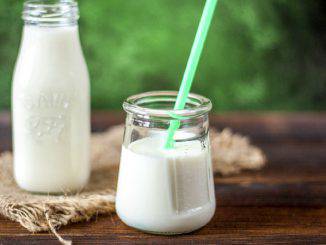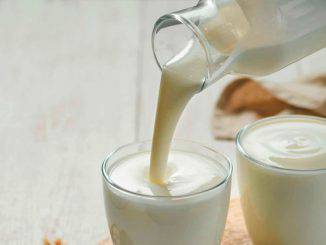
Let’s say it clear: you will hardly find a medical specialist who does not recommend Kefir consumption during pregnancy.
During the sensitive period of pregnancy, the woman’s body undergoes significant changes related to the fetus’ growth and development. Therefore, it is recommended that all expecting mothers reconsider their diet, emphasizing natural products, and fermented dairy products such as milk Kefir must occupy a special place on the menu.
Why fermented dairy? Well, simply because fermented dairy products uniquely combine some critically important nutrients, minerals, and vitamins, with a long list of probiotics with undoubtedly positive effects on both the mum and the baby.
We have written a separate detailed post dedicated to Fermented dairy products (a.k.a. cultured dairy products) where you can read more about the general health benefits of these products.
And, of course, amongst all fermented dairies, Kefir should occupy the most prominent place.
This tasty fermented milk is recognized worldwide for its ability to improve all body functions, including the stomach and intestines, and a healthy gut is critically important for both mother and baby.
But is everything that simple? Definitely not! While the long list of benefits of Kefir is not questionable, pregnant women usually need more details and ask reasonable questions like:
- What exactly will Kefir do to me and my baby?
- What are the real health benefits of Kefir for me and my baby?
- How much Kefir can I drink per day for an optimal effect?
- What kinds of Kefir should I use?
- What types of milk should I use to make Kefir?
- Do I run any risks, and should I take any precautions?
Stay tuned! We are going to answer all these questions here.
Benefits of Kefir during pregnancy
First of all, Kefir provides mothers-to-be with precious probiotics, nutrients, and vitamins that virtually no other fermented product can provide in one place.
The probiotics in Kefir can slow down or even completely stop all putrefactive processes in the gut, they support the absorption of vitamins and minerals, and prevent the development of harmful microorganisms in the expectant mother’s body.
Furthermore, Kefir is considered a major supplier of calcium to the woman’s body. Calcium in Kefir is absorbed easily and quickly, serving both the woman and the baby as a valuable source of this mineral, vital for the baby’s growth.
During the sensitive period of pregnancy, women often experience heartburn and bloating, and by including Kefir in their diet, they can relieve this discomfort by improving the overall functioning of their gastrointestinal tract.
Let’s remind that Kefir is relatively low in calories, so expecting mothers can safely include it in the menu without fear of gaining any extra weight. Still, Kefir provides the expectant mother with all the fundamental nutrients needed for her and her baby. Expectant mothers, who fear problems with gaining weight, can even implement a fasting day of a Kefir-only diet during their pregnancy. The nutrients, minerals, and probiotics of Kefir will be enough to keep both mum and baby safe during that day.
You can read more details about the health benefits of milk Kefir in this post.
People often ask whether pregnant women can drink Kefir every day.
In the absence of contraindications, pregnant women may consume Kefir in reasonable quantities every single day.
The keyword here is “reasonable”. Yes, it is worth reminding that drinking too much of it may not be very useful during pregnancy. The potential laxative effect of large quantities of Kefir may present a risk. While any stomach discomfort after huge intakes of Kefir quickly and easily fades away, its potential laxative effect may lead to temporary dehydration that may not be beneficial for the baby.
Briefly, any excessive use of any product may not be beneficial, and Kefir makes no exception.
A frequent problem of pregnant women is vaginal thrush – a disease caused by fungi called Candida – very common in pregnancy due to increased glycogen levels or antibiotics. There are many drugs for this disease, but the result is short-lived, and using chemistry drugs during pregnancy is generally not a good solution. However, the regular use of Kefir will lead to the normalization of the intestines’ microbiota, which will boost the immune system and help overcome the infection caused by Candida.
More details about the assets of Kefir against Candida infections can be found in our post titled “Can Kefir help with Candida infections?”
Furthermore, a scientific study in Norway established a causal association between probiotics and reduced risk of preeclampsia and preterm delivery, recommending probiotics as an excellent public health measure to reduce these risks related to pregnancy.
No doubt: Kefir should be considered a top priority, as the researchers found that drinking fermented milk during late pregnancy was associated with a 20% lower risk of preeclampsia.
According to the same study, drinking fermented dairy products in early pregnancy was also linked to a 21% lower risk of preterm delivery than women not taking fermented probiotic dairies during the same stages of pregnancy.
What Kefir to use during pregnancy?
During pregnancy, women should prefer products that do not contain preservatives, or in other words, products that have a relatively short shelf life. As a 100% natural product, adding a myriad of beneficial bacteria to our bodies, homemade Kefir comes first once again.
Yes, we know that the commercially available packs of Kefir look safer than the homemade Kefir, but mind you that the commercial product rarely contains all probiotics and nutrients the homemade Kefir does. The simple reason is that commercial products include preservatives to extend their shelf life, and preservatives may seriously interfere with fermentation and downgrade the probiotic properties of Kefir.
Some commercially available products are even pasteurized after fermentation which usually destroys most living bacteria in Kefir, drastically reducing its probiotic powers.
You can find more details about the advantages of homemade Kefir compared to the commercial one in our post called “Homemade v/s Store-bought Kefir. Which is better?”
How much Kefir should pregnant women drink?
As we already said, too much is never good. The reasonable daily quantity of Kefir for pregnant women should typically be about 500 milliliters (17 oz). If the expectant mother has signs of constipation, she can only temporarily increase the intake to 700 milliliters (~24 oz) a day.
It is usually best to drink a glass of Kefir (250 ml / 8.5 oz) in the morning at breakfast, and another one in the late evening, before bedtime.
In the morning, the acidity levels in the stomach are at their lowest, which increases the chances of probiotics reaching their final destination – the intestines and the bowel. As for the evening glass, Kefir contains Tryptophan, which is known to have a relaxing effect on the nervous system and, when taken in the evening, it usually improves night sleep.
Note: if you have never taken Kefir before, its first use should be approached with caution.
Note that the first intake of Kefir may temporarily boost your metabolism and put your stomach “in overdrive mode”, which may result in transitory symptoms of bloating, flatulence, or even diarrhea. These symptoms are, in most cases, temporary and will fade away once your stomach adapts to Kefir, but it is a good idea to be slightly more cautious during pregnancy.
To avoid or minimize these effects, it is better to initially take only small doses of Kefir and then increase dosage once your gastrointestinal tract adapts.
It is a good idea to start with no more than 50-60 grams (2 oz) per day, and then, if everything goes fine, increase the dosage gradually to 1 or 2 cups.
It is also imperative for pregnant women to never use Kefir made of “raw” (unpasteurized) milk!
Always use only pasteurized or boiled milk because raw milk may contain harmful bacteria like Brucella that do not get neutralized by the fermentation process of Kefir.
A more detailed analysis of any potential risks hidden behind the consumption of Kefir can be found in our article titled “Possible dangers of Kefir”.
Please find any additional information about the dosage of Kefir in our dedicated post “How much Kefir should I drink per day?”
What precautions should pregnant women take?
Kefir is one of the few products with virtually no contraindications for healthy people. Still, women expecting a baby should be cautious, aware of some restrictions, and take some precautions.

Allergies
First of all, before using Kefir, pregnant women need to make sure they are not allergic or somehow intolerant to Kefir or milk products in general.
It is important to stress that milk allergy and milk intolerance (or lactose intolerance) are very different things.
While milk (or lactose) intolerance is a relatively mild health condition related to inefficient metabolization of milk products, milk allergies are severe autoimmune diseases that may lead to violent reactions of the body.
So, it is important to stress that while Kefir is relatively low in lactose and very well tolerated by lactose-intolerant people, it still may be a thread for people affected by a milk allergy.
If the expectant mother has ever been diagnosed with milk allergy or has ever observed any allergic reactions to milk or milk products, she should stay away from any milk products, Kefir included.
Increased stomach acidity and some stomach ulcers may also be a contraindication to use Kefir (not only for pregnant women). On the other hand, several studies suggest that Kefir may even have beneficial effects on infections and ulcers caused by Helicobacter pylori.
Alcohol
The presence of alcohol in Kefir may be a concern for pregnant women. And yes, like all fermented products, Kefir also contains alcohol (ethanol).
However, the quantities of alcohol in milk kefir are negligible – up to 0.5%, which is unlikely to cause any harm. However, the alcohol content of water kefir can go up to 1.5 or even 2.5%, which may be a genuine concern.
That is why, not only because of its lower alcohol content but also because of its much more potent probiotic features, milk Kefir is considered safer and more beneficial during pregnancy.
Pasteurization
As we said earlier, pregnant women should never be tempted to consume Kefir made of unpasteurized (or “raw”) milk. Raw milk can contain harmful microorganisms that fermentation processes will not destroy.
On the other hand, some sources advise expectant mothers to take commercial Kefir, which is pasteurized after its fermentation.
Although such advice may sound safer, it may not be the best option. Pasteurization after Kefir’s fermentation makes it sterile and deprives it of its main beneficial factor – the probiotic bacteria.
So, in our opinion, it is best for expectant mothers to make their Kefir at home using commercially pasteurized fresh milk, inoculating it with healthy kefir grains, and consuming it fresh, with a relatively short secondary fermentation.
Shorter secondary fermentation is advised because both alcohol content and acidity levels of kefir increase during this stage, which may not be beneficial for pregnant women.
Quantity
As we already said before, excessive use of milk Kefir could lead to diarrhea, resulting in the mother’s body dehydration which may be unsafe for the baby.
Summary
In general, mothers-to-be should always consider consuming fermented foods containing live microorganisms with the appropriate precautions.
Kefir has a long list of positive effects that will benefit both the mum and her unborn baby. Still, it is a good idea for pregnant women to begin taking Kefir carefully, starting with small quantities, and gradually increasing intake to the recommended amount of two glasses of Kefir a day (about 0.5 liters or 17 oz).
While homemade Kefir is always recommended compared to commercially available Kefir, pregnant women should never be tempted to consume homemade Kefir made of unpasteurized (or “raw”) milk. Raw milk can contain harmful bacteria that will survive fermentation and may cause severe diseases.
Beyond these very few precautions, however, milk kefir is considered not only safe, but very beneficial during pregnancy.
Kefir balances the immune system controls the appetite, and contains vitamins A, C, B1, B2, and PP. All these beneficial properties of Kefir explain the positive answer medical experts usually give when asked if Kefir is suitable for pregnant women.
Beyond its undoubtful powers as a potent probiotic, Kefir has also been found to reduce the risk of:
1. Preeclampsia. According to a study by the Norwegian Institute of Public Health, daily consumption of a milk-based probiotic significantly reduces the risk of the condition.
2. Gestational diabetes. That is due to the ability of beneficial bacteria to lower blood sugar levels.
3. Increased blood pressure during pregnancy by decreasing the overall cholesterol levels in the body.
4. Intrauterine restriction of fetal growth. Probiotics help reduce C-reactive protein, whose elevated levels are often associated with low birth weight.
5. Problems with baby’s skin. Suppose probiotic bacteria dominate the mother’s body. In that case, she will pass them on to the baby during pregnancy and later through breast milk, thus preventing it from developing various variants of dermatitis.
And a final warning: since the use of probiotic foods is in general considered safe during pregnancy, there is one probiotic drink that is NOT considered safe for expecting mothers, and this is kombucha. The problem with kombucha is the higher risk of contamination hidden in the way kombucha is prepared.
The fermentation of kombucha may last up to 10 or even more days! During this prolonged fermentation, the risks of contamination with unwanted bacteria or even molds are considered unacceptably high for pregnant women. So, kombucha is most probably the only probiotic food that is not regarded as safe during pregnancy.



